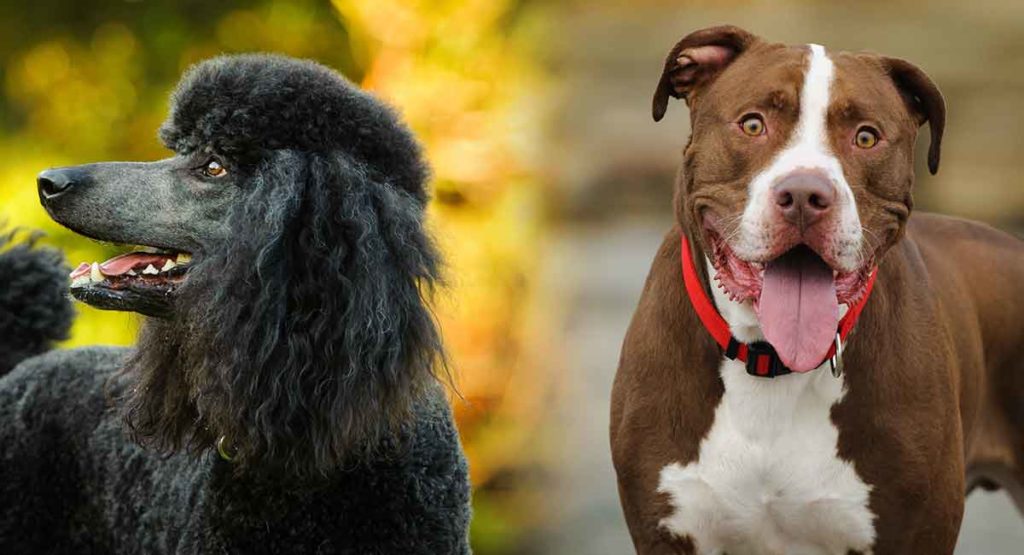(By Rabbi Yair Hoffman for 5TJT.com)
Recently, YWN reported that more than a dozen rabbis from the city of Elad near Tel Aviv issued an edict forbidding all dogs. It labelled all dogs bad and warned residents that keeping them will make them accursed.
No one doubts that Pit Bulls, Rottweillers, German Shepherds, and Mastiffs are dangerous dogs and there should be laws made to ensure the safety of citizens. In the United States alone, 471 Americans were killed by dogs from the 14 year period between 2004 and 2018. Almost 85 percent of these victims were killed by these four breeds alone.
In the United States you are 67 times more likely to die of a dog bite than of a shark bite.
On the other hand, when was the last time a poodle killed someone?
HALACHIC QUESTION
So the question is: Do we forbid all dogs because of the more dangerous ones? Is there another reason to forbid all dogs? Do we forbid the barking but biteless poodle?
THE ELAD EDICT
The edict contains the signatures of all the Sephardic rabbis in Elad and the city’s chief rabbi, Mordechai Malka. It states as follows:
“We have heard and have seen that lately, a serious phenomenon has spread in our city Elad, in which young boys and children walk around publicly with dogs. This is strictly forbidden, as explained in the Talmud and by the Rambam, anyone raising a dog is accursed and especially in our city where many women and children are afraid of dogs,” the anti-canine edict states.
The edict further stated, “The term ‘bad dog’ means ‘any dog, for it barks on whomever it does not know and because of its bark it is a bad dog even if does not bite..’
The rabbi of neighboring Holon, Rabbi Avraham Yosef, son of Rav Ovadiah Yosef, is quoted as writing: “I do not find any grounds for permitting any dog whatsoever in any manner.” The edict did allow for one exception: People who keep dogs for medical needs should appear before the local rabbinical court so it may rule on their matter.
IS IT TRUE?
But is what the Elad Edict states – true according to Halacha?
The Mishna in Bava Kamma 79b discusses the prohibition in raising “the dog.” But to what does the Mishna refer to? Does it include the poodle?
Rashi gives us some insight. He writes that the reason that is forbidden is because it both bites and barks. He further explains that out of sheer fright, an expecting woman can possibly miscarry on account of the bark. Rabbi Yehoshuah HaKohen Falk (1555-1614), author of the Smah (Choshain Mishpat 409:5) explains that Rashi is actually presenting two different reasons here. He writes that, according to Rashi, either reason alone would be sufficient to chain the dog. Thus, according to Rashi, the barking and biteless poodle must be chained. This also seems to be the view of the Rambam (Nizkei Mammon 5:9), the Rif (BK 30) and the Rosh in their restatement of the Gemorah’s rulings. The first Lubavitcher Rebbe in his Rav Shulchan Aruch (Shmiras Guf v’haNefesh) rules in accordance with the more stringent view.
The Gemorah in Shabbos 63a writes that whomsoever raises a dangerous dog in his home prevents chessed from happening in his home. This is because those who seek Tzedakah will refrain from soliciting at his house because they are afraid of the dog. The Maharsha on the Gemorah in Shabbos actually changes the girsah wording of the Gemorah and removes the modifying word “dangerous.”
THE LENIENT POSKIM
The Hagaos Maimanius (Hilchos Rotzayach 11:3) writes that it is permitted to raise a dog that is not rah – dangerous. The Tosfos Yom Tov in his commentary on the Mishna remarks that the fact that the Mishna uses the “definite article” – the dog – means that it refers only to a dangerous dog. The SMaG in Mitzvos 66 and 67 also presents the lenient view.
The language of the Tur Shulchan Aruch in Choshaim Mishpat (409:6) also indicates a lenient view. He writes:
It is forbidden to keep a dangerous dog unless it is chained.. In a city that is next to the country’s border – it is permitted to keep it unchained during the day, but chained at night.
The Shulchan Aruch 409:3 rules like the Tur.
The exception of keeping the dog chained refers only to dangerous dogs according to both the Yam Shel Shlomo and the Aruch HaShulchan. [It should be noted, however, that the Yam Shel Shlomo includes barking dogs as within the definition of dangerous].
Thus, the Shulchan Aruch and the Tur both rule like the lenient opinion. The poodle is safe in terms of strict halacha! Halacha does allow for dogs that do not bite. The Elad Poskim are being stringent beyond Shulchan Aruch.
The Ramah adds an additional leniency. He writes that, nowadays, when we live among the gentiles – it is permitted according to all. The Vilna Gaon explains that the anti-Semitism makes it similar to the border city discussed in the Talmud.
FEAR OF HEAVEN
There are a number of other factors, however, from a hashkafic pont of view that, in this author’s opinion, should be taken into account. The introduction to the Shev Shmaitzah cites an early G-d fearing person who was found sleeping in an area where there might be a danger of wild animals. When asked why he slept there – he responded that he is embarrassed to be afraid of something other than fearing Hashem. The Shev Shmaitzah thus holds that the highest level of fearing Hashem is not to be afraid of anything else other than Hashem.
Hashem put fear into the world as a protective measure for us. However, that fear should eventually be replaced with an intellectual fear not an emotional one. In this author’s view it is a Chillul Hashem that Torah observant Jews are afraid of dogs. It should be something that we overcome (granted that there are many more important things to work on, but still). If we create an edict banning dogs we will never overcome this fear.
A second point is that there is a Mitzvah to express hakaras Hatov to dogs because they did not bark when we exited Mitzrayim. The Torah tells us to give them the non-kosher meat that we end up with as a reward. If we ban all dogs how can we fulfill this gesture of hakaras hatov?
Finally, there is a concept called chanoch lano’ar al pi darcho. Sometimes we have to be less rigid and think out of the box in order to resolve some of our communal issues. Not every child is the same and many kids and people can benefit from what a pet can offer. If the Shulchan Aruch permits it – why not avail children of an important resource?
Studies have shown that having a relationship with a pet can help develop achrayus (responsibility), empathy, communication and yes, empathy – echpatius.
The Midrashim point out that Moshe Rabbeinu, Dovid HaMelech, and many other leaders took care of sheep prior to their being elevated to their status of leadership.
As a general rule, studies have shown that kids with pets have higher self esteem, improved social skills, are more likely to be physically active, are less likely to be overweight or obese and have greater family harmony. There are health benefits too. Pet owners have decreased risk of cardiovascular disease, fewer minor illnesses and complaints.
True, it is not for everyone. But very often, taking care of animals does wonders for kids. The ban should be repealed because of all of the above reasons.
The author can be reached at [email protected]
(YWN World Headquarters – NYC)












18 Responses
So you think the Israeli Rabbis are being too Ruff?
What is the view of the Pele Yoetz?
Rabbi Hoffman, I simply cannot understand your point. How about the dog being Tumah? Is that what we want to portray in a Jewish home? The comparison of LeHavdil the dog within our lifestyle habits and our Chusheve Sages is so far apart from anything similar.RABBI HOFFMAN RESPONDS: THE ARIZAL AND OTHERS FORBADE KILLING MICE IN THE HOME. ARE MICE MORE TAMEH THAN DOGS? THE DAAS ZEKAINIM SAYS THAT YOU MUST EXPRESS HAKAAS HATOV FOR WHAT THEY DO. THE YERUSHALMI TRUMOS 8:3 DISCUSSES A DOG IN THE HOUSE.
I am sorry Rabbi, but this time you have it all wrong. Please ask some of our local Chusheve Rabbonim if they agree with you. SHOW THEM THE YERUSHALMI TRUMOS 8:3 FIRST
A Jewish Home where the Schechina Hakdoshe resides does Not have place for a Tumenah Dog!! WE PASKIM LIKE YERUSHALMIS WHEN THE BAVLI DOES NOT DISAGREE. THE YERUSHALMI IS DICUSSING A DOG IN TEH HOMW
to “Let the truth be told”
Only a dog is tomei?
Donkeys and horses are also “tomei”.
The ovos, tanoim and all the great Rabonim up to the invention of motors kept them and used them!
The main issue here which no one seems to get — the people in Elad who keep dogs don’t care about whet the Rabonim say and will not listen to them.
Hazal already warned us the it is a mitzvah NOT to say something that will not be heeded.
In general, people who have an irrational fear of dogs should seek therapy.
It’s quite common for all breeds of “domesticated” dogs to bark at strangers who just pass by the homes where they are kept, and more often when they knock at the door. This is often distressing and/or intimidating to average people, sometimes extremely so. Anyone who wants to cultivate midos tovos, or who just cares about other people, should recognize this fact of life. But many dog owners seem to be in denial regarding this – perhaps because the culture whitewashes the issue by portraying dogs as acceptable “best friends” to mankind.
The Rabbonim in Elad were reacting to a genuine problem that needed to be acknowledged. No matter how one construes the gemara, the fact remains that dogs in Elad were causing pain to some people. That important reality seems to have gotten overshadowed by the impressive demonstration of scholarship in this article.
As someone who has been trained in dog handling and has owned multiple dogs for decades, including giant breed dogs, I wish to point out the following: Dogs are often referred to as “man’s best friend.” Generally, a dog will behave as it is taught to behave; in a way very similar to children: if the owner teaches it to behave, it will. If it teaches it or allows it to misbehave, it will.
Additionally, there are dogs that instinctually will be more protective of their owner and/or their environment. Owners have the responsibility to train their dogs to respond appropriately to different situations. There are Pit Bulls that are fabulous gentle dogs and poodles that bite; it really depends on the owners.
I would just add that apparently the author doesn’t know much about dogs. Mastiffs were bred to protect their environment, but were taught to tackle the intruder instead of biting. This teaching has become instinct in the breed, and it is very rare to see a Mastiff bite. By and large, Mastiffs are very lazy gentle dogs who keep a watchful eye on their environment and of their owners. Plus, they rarely bark even when someone is at the door. Instead, they just keep a watchful eye and are ready to intervene when necessary.
In a way, you could say owning a dog is somewhat similar to owning a firearm. Firearms don’t kill; people do. A dog who has been trained will behave himself, regardless of breed. (Of course it is not a perfect analogy as guns are inanimate objects and dogs can act on their own will. But there is a similarity.)
Again, dogs are an excellent representation of their training, so any breed dog – or a mutt – can be excellent or bad, depending on its training and environment.
to ysam
you write
“This is often distressing and/or intimidating to average people, sometimes extremely so”
Average people are not distressed or intimidated just by hearing a dog bark!
Only people who have an “issue” react that way.
They should see a therapist and not bother other people with their problems.
and to ChaimTovim
Thanks for the excellent comment!
“In the United States you are 67 times more likely to die of a dog bite than of a shark bite.”
I nominate this for “Most Useless Piece of Information 5789”
I got bit by a small poddle as I walked by. I dont hate dogs but agree that unless there is a compelling need, a Jew shouldnot own one, and if he does own one he must accept all responsibilities for what the dog does.
To EDGARHOOVER
Yes and No. Depends what one means by “distress” and on the situation.
By “distress”, I didn’t mean “freaking out”, which would indeed be a symptom of pathology. I just meant “disturbing” – it can be quite unpleasant to be barked at or yelled at. That’s not a phobia.
Regarding situations, there are everyday occurrences where the barking dogs are extremely close and/or extremely loud and aggressive. I’m not afraid of dogs, but I’ve been rattled by dogs who surprise me at a fence when I walk by house, and by dogs that bark loudly in your face and have to be restrained by their owners when I enter a home.
According those poskim cited in the article who interpret the Gemara as referring to just barking, and forbid situations such as the above – the halacha unambiguously sanctions the dog owners, rather than pathologizing people for feeling distress when they are barked at.
Continuing … Also, children can easily be frightened by dogs barking at them. That’s common, and hardly indicative of a phobia. How could anyone defend causing that sort of distress to any child, even once?
“In this author’s view it is a Chillul Hashem that Torah observant Jews are afraid of dogs.”
Why? RABBI HOFFMAN RESPONDS: IN THE ARTICLE IT STATES WHY. IT STATES THAT THE HIGHEST LEVEL OF YIRAS SHAMAYIM IS NOT BEING AFRAID OF ANYTHING ELSE BUT HASHEM. IT IS THUS A CHILUL HASHEM IF JEWS ARE FRIGHTENED OF THINGS THAT EVERYONE ELSE IS NOT AFRAID OF.
As the author himself has written, dogs are dangerous, yes, some more than others.
If they have an extreme phobia of dogs, that can be disabling, but some apprehension of canines is normal, proper, and healthy. NO IT IS NOT HEALTHY TO BE AFRAID OF DOGS THAT ARE HARMLESS.
Does he think that being afraid of lions is also a Chillul Hashem?
“there is a Mitzvah to express hakaras Hatov to dogs because they did not bark when we exited Mitzrayim. The Torah tells us to give them the non-kosher meat that we end up with as a reward. If we ban all dogs how can we fulfill this gesture of hakaras hatov?”
Is that a mitzvah, and even if so, a mitzvah chiyuvis? YES IT IS. Does Rabbi Hoffman go around every day feedings dogs treif meat? Did Rav Moshe, Rav Yaakov, etc., do so? SEE YERUSHALMI TRUMOS 8:3 AND RAV CHAIM FRIEDLANDER CITES THIS YERUSHALMI AS HAVING NO ONE THAT ARGUES.
“Midrashim point out that Moshe Rabbeinu, Dovid HaMelech, and many other leaders took care of sheep prior to their being elevated to their status of leadership.”
Yes, sheep. We are not taught that they kept dogs, AFAIK. SEE YERUSHALMI TRUMOS 8:3
“very often, taking care of animals does wonders for kids.”
Okay, granted. So they can keep sheep, goats, chickens, ducks, horses, donkeys…
The claim that “a dog is man’s best friend” is not found in the Torah, AFAIK. IT SAVED THE MANS WIFE IN THE YERUSHALMI
I was once in a big grassy park, and a man was walking with a little puppy (that’s a baby dog for those of you who have no clue). The thing was tiny and was hopping through the grass. Everyone was sitting around enjoying themselves, and nobody was bothered. Everyone except for the frum family. Picture the scene: the kids were screaming and crying and the father was yelling “GET BACK IN THE CAR!” as he “bravely” placed himself between the puppy and his kids. And everyone else in the park was either laughing at them or confused. Annoyingly, *I* had to get questioned: “What’s wrong with you people?” even though I had nothing to do with it. LOL I bet the frum family had quite the “survival” story to share what they got home.
Just to clarify,
THis is not about people being afraid of dogs or what type of dogs.
There is no mention of the Torah allowing Tumah , especially Tumah dogs , in Jewish homes purely for pleasure .
All the comparison to our Avos having animals is nonsense. The animals that our grandparents kept were purely for Parnassah and not for Taavah or pets. When the author mentions Dovid Hamelech with the sheep, Dovid Hamelech was a Sheppard and looked after the sheep . It was not taking sheep into his home for pleasure.
Nothing in the Torah compares to our current Mishigas of Jewish homes owning dogs, especially big dogs!
Do you truly love the dog or do you love yourself and therefore get a dog???
If you truly have so much love for a dog, why do you not take that same love and put it into your children, spouse, family and so many other things to love Al PI Torah.
And for Rabbi Hoffman’s remark that we should bring the dogs into the house because of Hakoros Hatov for them not barking in Mitzrayim, I say, ” In Makos Urev, all big dangerous animals didn’t eat or harm the Jews of Mitzrayim. Does that tell us to bring all flesh eating animals into our homes for Hakoros Hatov ?
We need to conclude that we cannot take any reference from the Torah to allow Tumah animals as pets into our beautiful sanctuaries shared with Hashem unless yours is not a Mokam you want to allow the Schechina in. RABBI HOFFMAN RESPONDS: THE ARIZAL AND OTHERS FORBADE KILLING MICE IN THE HOME. ARE MICE MORE TAMEH THAN DOGS? THE DAAS ZEKAINIM SAYS THAT YOU MUST EXPRESS HAKAAS HATOV FOR WHAT THEY DO.. YOU CANNOT JUST MAKE UP HALACHOS ESPECIALLY IF THEY ARE KENEGED SHULCHAN ARUCH
Oy Oy Oy. I am willing to bet that most of the people commenting above have never owned a dog and many are likely afraid. The reason frum people are afraid of dogs is because of lack of exposure. I have been a dog owner for over ten years. I grew up in a very frum house and was never exposed and actually the day we got our first dog I was still afraid but quickly got over it. My son is autistic and it was recommended by his doctor that we get a dog. Was a great move. I love my dog and am proud to be a frum dog owner.
“As a general rule, studies have shown that kids with pets have higher self esteem, improved social skills, are more likely to be physically active, are less likely to be overweight or obese and have greater family harmony. There are health benefits too. Pet owners have decreased risk of cardiovascular disease, fewer minor illnesses and complaints.”
What if I changed it to “As a general rule, studies have shown that kids who eat cheeseburgers have higher self esteem, improved social skills, are more likely to be physically active, are less likely to be overweight or obese and have greater family harmony. There are health benefits too. Cheeseburger eaters have decreased risk of cardiovascular disease, fewer minor illnesses and complaints.”? RABBI HOFFMAN RESPONDS: IF SOMETHING IS PERMITTED IN SHULCHAN ARUCH, AND IF AMORAIM HAD DOGS, AND IF FRUM PEOPLE HAD DOGS THROUGHOUT EUROPEAN HISTORY AS THE DAAS ZEKAINIM CLEARLY SAYS, AND IF IT IS HEALTHY AND IF THE DAAS ZEKAINIM SAYS THAT WE SHOULD HAVE HAKARAS HATOV TO THEM FOR WHAT THEY DO FOR US – THEN YES WHY NOT? THE PROBLEM IS THAT CHEESEBURGERS ARE FORBIDDEN BY SHULCHAN ARUCH, BUT DOGS THAT DO NOT ATTACK PEOPLE ARE PERMITTED BY SHULCHAN ARUCH
It’s not an halachic argument.
Seriously everyone, nobody in the comments section is fit to argue with the Shulchan Arush and others who paskened that owning a non-evil dog is muttar:
“For domesticated and ‘well-behaved’ dogs there is no such restriction, and it is permitted to keep such a dog without concern (see Tur, Choshen Mishpat 409; Hagahos Maimoni, Rotze’ach 11:3; Semag, Aseh 66). This lenient opinion is noted by the Shulchan Aruch (Choshen Mishpat 409:3), and this is also the general ruling given by later authorities.”
If you don’t want one, don’t get one. But you can’t take that right away form someone else.
I think people should give the Elad area rabbonim some respect and not assume they are fools. They are there and know the local situation better than people thousands of miles away.
Sometimes when there is a dangerous matzav strong action needs to be taken to restore law and order. There is also a concept of lo plug – לא פלוג.
As to where people will be able to be mekayem the inyan of לכלב תשליכון אותו (if that is a genuine concern), they can find someone in a nearby area, a non-Jewish person with a kelev, or someone who the rabbonim allowed to keep a dog for medical reasons locally.